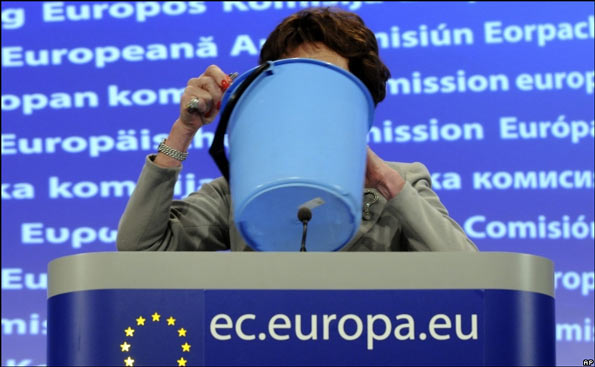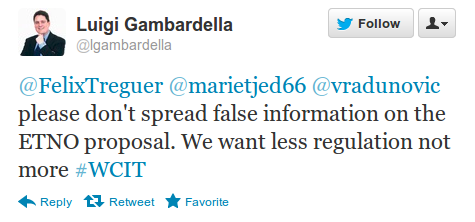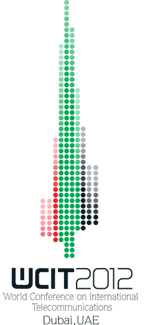For some months now, there have been intense discussions on the threats raised by the upcoming World Conference on International Telecommunications (WCIT). In December, the 193 Member States of the International Telecommunication Union (ITU), an agency of the United Nations, will gather in Dubaï for this important conference aimed at amending the ITU’s founding treaty, the “International Telecommunication Regulations” (ITRs).
ISOC and the Center for Democracy and Technology have analyzed the dangerous amendments proposed by many countries, which would expand the ITU mandate to cover issues such as IP addressing and routing, cooperation in cybercrime and further undermine global Internet governance1ISOC coverage of the WCIT can be found at: http://www.internetsociety.org/wcit. CDT’s policy briefs are available at: https://www.cdt.org/category/tags/itu. These are very serious sources of concerns, but because several important Members States of the ITU (in particular the US and the EU) and many civil society actors oppose an “ITU take-over of Internet governance”, it is unclear whether they could actually pass.
There is another proposal that have been made by a major European actor which, although it might seem technical and unrelated to freedoms online, could have a disastrous impact on Net neutrality2See our web-dossier on Net neutrality: https://www.laquadrature.net/en/Net_neutrality. It was detailed last week by ETNO – the lobby representing incumbent EU telecoms operators in Brussels – in its “contribution to WCIT“. And so far, policy-makers, in the EU and beyond, have remained silent, refusing to react to ETNO’s proposed changes to the ITRs. This suggests that ETNO’s proposal may actually have key political support.
[toc]
The EU’s inertia on Net neutrality
First, some context. In 2009, the EU adopted the “Telecoms Package“, a bundle of five European directives regulating the telecommunications sector. At the time, amendments pushed by prominent telecoms operators seeking to legitimise Internet access restrictions sparked an intense debate on Net neutrality.
Although EU lawmakers refused to enshrine Net neutrality in EU law, they struck down the worst amendments. Then, when the Telecoms Package was adopted, the EU Commission pledged to monitor the situation and said that Net neutrality would from now on be a “policy objective”3See European Commission Declaration on Net Neutrality added to the telecoms reform package of November 23rd, 2009: http://www.laquadrature.net/wiki/Commission_Declaration_on_Net_Neutrality_20091123.
 Since then, however, there has been mounting evidence of widespread access restrictions imposed by telecoms operators. Disturbingly, only the Netherlands adopted a legal framework protecting Net neutrality. Other countries seem to be waiting for the EU to take the lead, but the European commissioner in charge of the telecoms sector, Mrs. Neelie Kroes, has so far refused to take any action.
Since then, however, there has been mounting evidence of widespread access restrictions imposed by telecoms operators. Disturbingly, only the Netherlands adopted a legal framework protecting Net neutrality. Other countries seem to be waiting for the EU to take the lead, but the European commissioner in charge of the telecoms sector, Mrs. Neelie Kroes, has so far refused to take any action.
Meanwhile, the EU’s biggest operators, such as Vodafone, Deutsch Telekom, Orange or Telefonica, have extensively lobbied for the development of new business models based on restricting or discriminating users’ communications, which (although they try to claim to the contrary) would have dire consequences for Net neutrality.
This was made very explicit in early-2010, when the CEO of Telefonica declared that:
Internet search engines use our Net without paying anything at all, which is good for them but bad for us. It is obvious that this situation must change, our strategy is to change this.4 eitb.com, 6 February 2010, « Spanish Telefónica to charge Google, Yahoo, Bing ».
Address : http://www.eitb.com/news/technology/detail/350113/spanish-telefonica-to-charge-google-yahoo-bing/
Similar statements have been made by the CEO of Orange5See: http://www.numerama.com/magazine/17394-orange-souhaite-que-les-geants-du-web-financent-la-bande-passante.html and others.
Such language clearly shows that some telecom operators want to develop new business models by monetizing the communications coming from online services and going to their subscribers. Here is the idea: since some types of services sometimes suffer from congestion on current networks (think of YouTube’s video that take a long time buffering during peak hours), operators could provide “first-class” (i.e priorised) traffic delivery to online service providers who are able to pay — what they call a “differentiated Quality of Service” (QoS) — which would also inevitably slow down the rest of traffic. To implement paid differentiated QoS, operators would negotiate so-called “interconnection agreements” with online service providers.
Through ITU, EU telcos follow a policy-laundering strategy
But there is one thing that these companies fear: that, in the process of the Net neutrality debate, they could be banned by lawmakers and regulators from establishing such business models. The recently-adopted Dutch legislation shows that, under the pressure of civil society, lawmakers can decide to actually enforce Net neutrality, establishing stringent regulations against telecoms operators’ discriminatory traffic management practices and commercial agreements.
Such fear explains why, last June, US telecoms operators AT&T and Verizon sued the French regulator ARCEP over its decision to gather data on so-called “interconnection agreements”6Mike Corkerry, 21 June 2012, « Verizon and AT&T statement regarding ARCEP’s attempt to regulate Internet peering and transit », AT&T Public Policy Europe. http://www.attpublicpolicy.eu/2012/06/verizon-and-att-statement-regarding-arceps-attempt-to-regulate-internet-peering-and-transit-agreements/. Telcos are strongly pushing against any regulation in this field, and have the EU Commission’s ear.
So just like the entertainment industry tries to establish repressive measures against file-sharing through trade agreements such as ACTA, incumbent operators are going to the ITU to push their agenda. It is a clear policy laundering strategy. The idea is to make sure that ITU rules will prevent Member States from regulating the way telecom operators may restrict, prioritize or otherwise discriminate Internet communications. To that end, ETNO proposed the following amendments to the ITRs:
3.1 (…) Member States shall facilitate the development of international IP interconnections providing both best effort delivery and end to end quality of service delivery.
4.4 Operating Agencies shall cooperate in the development of international IP interconnections providing both, best effort delivery and end to end quality of service delivery. Best effort delivery should continue to form the basis of international IP traffic exchange. Nothing shall preclude commercial agreements with differentiated quality of service delivery to develop. (Our emphasis).
According to ETNO, the ITU’s founding treaty should “enable incremental revenues by end‐to‐end QoS pricing and content value pricing” and allow for “new interconnection policies based on the differentiation of the QoS parameters for specific services and types of traffic (not only on the “volume”).” That, they say, should be part of the “Internet ecosystem” (i.e. not just for so-called “managed services” or “specialized services”, which are private IP networks distinct from the public Internet), and should be decided between network operators and online service providers, putting regulators and end-users out of the picture once and for all.
The dangers of the ETNO proposal
ETNO’s proposal is totally contrary to a comprehensive definition of Net neutrality. There are still debates in political circles about what exactly is Net neutrality. Everybody will say they agree with the concept, but will provide varying definitions depending on how sympathetic they are to the policy options defended by incumbent players in the telecoms sector.
In France, a parliamentary report rightly stressed last year that Net neutrality is to be understood as the “Internet users’ ability to send and receive the content of their choice, to use services or run applications of their choice, connect the equipment and use the programs of their choice (…) with a transparent, sufficient, and non-discriminatory quality of service (…).”
The report clarifies a key point: the notion of “non-discriminatory QoS” means that Internet access provider cannot establish “differentiated QoS” on the public Internet. According to the French Members of Parliament:
The concept of nondiscrimination can be interpreted in various ways, including as a homogeneous treatment of flows, as a differentiation in how flows are processed according to the objective needs of the uses they support, or as no discriminatory access to various levels of quality of service. (…) The concept of nondiscrimination is used here in the sense of homogeneous delivery. (Our emphasis).
This is a rigorous definition of Net neutrality. Preventing operators from introducing differentiated QoS interconnection policies is indeed of paramount importance to protect the Internet.
If ETNO’s proposals were adopted, they could:
- Hurt freedom of communication, by preventing Member States from adopting rigorous Net neutrality regulations to ban operators from blocking, throttling, or priorising specific types of content, applications or services, since the ability to provide differentiated QoS on the Internet would be explicitly protected by the ITU.
- Undermine privacy, by leading to the generalization of privacy-invasive traffic monitoring technologies, such as Deep Packet Inspection. Such technologies would be necessary to identify specific types of traffic and implement ad hoc policies as provided by interconnection agreements, but would de facto establish a comprehensive surveillance infrastructures over vast portions of the Internet.7For more information on DPI, see Milton Mueller, October 2011, “DPI Technology from the standpoint of Internet governance studies: An introduction”. http://dpi.ischool.syr.edu/Papers_files/WhatisDPI-2.pdf
- Hamper innovation and competition, by favoring powerful service providers such as Google, which would be in position to pay for priorisation, whereas smaller players and new entrants would be at a competitive disadvantage. It would be the end of the level playing field provided by the Internet economy.
- Decrease incentives to invest in more bandwidth. Congestion would increase the value of differentiated QoS agreements providing priorised traffic delivery. Operators would therefore be in position to benefit from the scarcity of their network’s bandwidth, and would have less incentives to invest in increasing the capacity of their networks.
The WCIT as a defining moment for Net neutrality
The ETNO chairman, Luigi Gambardella, argues that his proposal is harmless, and that any attempt to criticize it is just “false information” and bad “propaganda“.

According to him, ETNO’s amendments on differentiated QoS are only about “consumer choice”: “The problem is that we want more choice. In the end, the customer will have more choice. It’s like if you travel in economy. But why don’t you also allow business class, a premium class, to differentiate the service?“, he said in an interview.
But he is quite explicit about the policy-laundering scheme: “Our proposal is to impede some member state to regulate further the Internet“… Regulate against the telecoms operators’ attempts to break the Net, that is.
ETNO’s proposal could put an end to the Internet as we know it, but it has at least one merit: It will force EU policy-makers, and in particular Neelie Kroes, to make clear where they stand. In the last months, the EU commissioner for the Digital Agenda has showed an obvious lack of will to legislate on the matter, invoking dubious “free market” arguments not to intervene. In a 2011 report on Net neutrality, she claimed that there was no problem with ongoing access restrictions and that any bad behaviour would be solved by the market anyway. She also refused to condemn the plans of some telecoms operators to charge for differentiated QoS8See her response to a parliamentary question on the matter: http://www.europarl.europa.eu/sides/getAllAnswers.do?reference=E-2011-004665&language=BG. Lastly, the Commission’s recent proposal for a WCIT negotiation mandate paves the way for exactly the type of amendments pushed by ETNO9The EC recommendation proposes that the EU “oppose any proposals to extend the scope to areas such as the routing of Internet-based traffic, content-related issues“, which sounds reassuring. However, in the 2(g), the document also says the EU could “support pro-competitive measures intended to help achieve lower prices, and greater transparency on prices, for international telecommunications traffic, based on commercial negotiations in a free and fair marketplace“, which seems totally compatible with the treaty change advocated by ETNO..
It is time for Neelie Kroes and other policy-makers to step up against ETNO proposal, and protect citizens’ freedom of information as well as free competition and innovation online against the predatory behaviors of dominant, rent-seeking operators.

References


